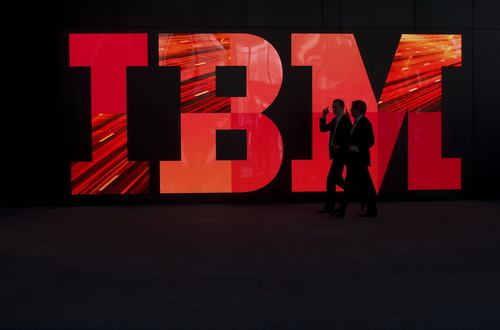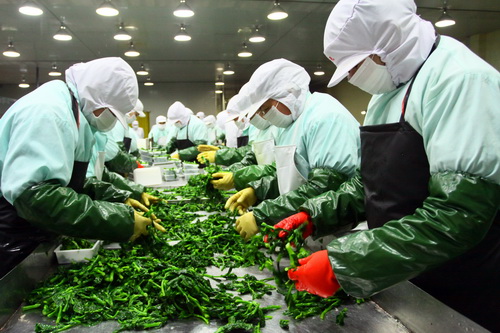Issue Wrap No. 512, March 28, 2011
Highlights from the EO print edition, Issue Wrap No. 512, Mar 28, 2011

Salt Industry Reform Delayed
News, cover
~ The liberalization of China's heavily state-controlled salt industry has once again been delayed.
~ Based on an original plan aimed at breaking up the existing salt monopolies, 100 salt producers were to be allowed to sell their products directly to consumers or distribution networks outside the salt industry this year.
~ However, the China Salt Association and the China National Salt Industry Corporation (CNSIC), by raising the problems caused by the recent panic-buying of salt triggered by the Japan nuclear crisis, have succeeded in persuading the National Development and Reform Commission (NDRC) to delay reforms.
~ The EO had earlier reported that CNSIC believed that the salt industry needs at least three more years before it can be liberalized, meaning the industry will remain closed until 2015.
~ Now analysts say that China's salt monopolies won't be eliminated until 2016 at the earliest.
Original article: [Chinese]

Corruption at IBM's China Office Exposed
News, cover
~ According to documents filed with a federal district court in Washington, D.C. in mid-March, International Business Machines Corp., better known as IBM, has agreed to pay 10 million US dollars to settle U.S. civil charges that employees at three of its Asian units and a South Korean joint venture bribed South Korean and Chinese government officials with cash payments, improper gifts and overseas trips from 1998 to 2009.
~ On March 24, all ofIBM's China-based employees were told to refrain from speaking about the case.
~ The details of the complaint petition shows that between 1998 and 2009 IBM spent money on bribes that were recorded as basic business expenses. However, starting in 2004, IBM China including subsidiary companies IBM Investment Co,. Ltd. and IBM Global Services Co., Ltd together spent a large sum of money entertaining Chinese government officials through overseas travel trips and gifts. During this period there were about 114 illegal bribery cases recorded in China.
~ Several IBM partners and even local travel agencies were also involved. According to the complaint, IBM's China employees created a slush fund to bribe Chinese officials with overseas trips. Another slush fund although not recorded was used for cash bribes and gifts, which included cameras and notebook computers.
~ IBM signed a sales agreement with state-owned enterprises in China to provide hardware, software, and training to its customers. In certain cases, training is conducted off-site requiring customers to travel for a period of time.
~ Prior to the excursion, IBM employees are expected to submit Chinese travel requests, known as DTRs, detailing the commercial purpose of travel, tourism, entertainment, and activities for all programs, including all estimated costs. All of IBM's overseas trips were subject to the approval of DTR level Chinese managers. DTRs are considered strict standards, however, they still failed to prevent over a hundred cases of bribery.
~ There were various violations. For example, IBM employees were found cooperating with local travel agencies to get past DTR standards. DTR also accepted fake invoices and documentation. Many travel expenses were not work related, including unauthorized sightseeing arrangements. Travel expenses, gifts, and meal arrangements for Chinese government officials were also all illegally paid for by IBM.
~ False travel claims were not limited to junkets for government officials, over 100 IBM employees are said to have been involved in efforts to abuse the company's official travel rules.
~ After the IBM investigation occurred in mid-2010, over 100 employees in China's IBM sales and service departments were demoted, and 20 employees were asked to leave. The two upper level managers were also held responsible for their actions. While one was forced into early retirement, the other volunteered to leave.
Original article: [Chinese]
Changes to Import and Consumption Tax on the Agenda
News, page 3
~ A national working meeting devoted to the issue of China's import policy that was originally scheduled to take place in March has been postponed.
~ The postponement has led to concern that adjustments to national import and consumption tax might be on the table.
~ Commerce Minister Chen Deming has previously indicated that his ministry is considering the issue of import taxes in order to boost imports. “
~ Chen was quoted as saying the he was personally inclined to make some changes.
~ An unnamed official from China's Ministry of Commerce told the EO that "In discussions about the new policies, the most difficult issues are import duty rates, consumption tax rates and the difficulting that import companies have in raising finance." The same official went on to say, "it's hard to find a balance among the many ministries involved."
~ Although the policy changes are still under discussion, judging from the current state, it seems like import taxes and consumption tax will be dramatically altered.
~ When the work meeting is finally held, it's expected to address the problem of Chinese consumers paying much more than other consumers for some products.
Original article: [Chinese]
Experts Discuss Local Government Debt
News, page 6
~ During the meeting of the People's Congress and the Consultative Conference in March 2011, Premier Wen Jiabao made a point of emphasizing that the overall situation in regard to debt held by local governments needs to be audited and monitored, with the goal of establishing a standardized debt financing mechanism.
~ The EO sat down with a group of experts to discuss the issue of local government debt.
~ The experts were: Gao Peiyong (高培勇), director of the Institute of Finance and Trade Economics at the Chinese Academy of Social Sciences, Liu Shangxi (刘尚希), deputy director of theResearch Institute for fiscal Science (RIFS) at the Ministry of Finance and Guo Yuqing (郭玉清), from Nankai University's School of Economics.
Original article: [Chinese]
Quality Concerns Delay Emergency Shipments to Japan
Corporation, page 27
~ In the wake of Japan's nuclear crisis, emergency orders for vegetables have been flooding in.
~ Export prices of vegetables from Southern China have risen between 25 and 30% with expectations for further growth.
~ Shipping vegetables to Japan should be quick and efficient, but rigorous standards about exports and concerns about pesticide residue have delayed the process.
~ Japanese distributors are strict about food safety and will refuse to work with suppliers that have delivered substandard products in the past.
~ Therefore, Chinese companies carefully inspect vegetables, meat, fish and other food products headed for Japanese shores.
~ Emergency supplies have crowded Hong Kong's ports, but Japan's demand for food is likely to increase in the next 2-3 months.
~ Li Meng, a researcher at the Samsung Institute, believes that reconstruction efforts in Japan will bring new market opportunities for China, but that suppliers must adjust to meet Japan's strict standards for quality and safety.
Original article: [Chinese]
The views posted here belong to the commentor, and are not representative of the Economic Observer |
Related Stories
Popular

- Japan Earthquake:To Stay or to Go?
- Tourists are leaving, and the trend spread to longer-term residents of the country.
Interactive
Multimedia

- EEO.COM.CN The Economic Observer Online
- Bldg 7A, Xinghua Dongli, Dongcheng District
- Beijing 100013
- Phone: +86 (10) 6420 9024
- Copyright The Economic Observer Online 2001-2011
















